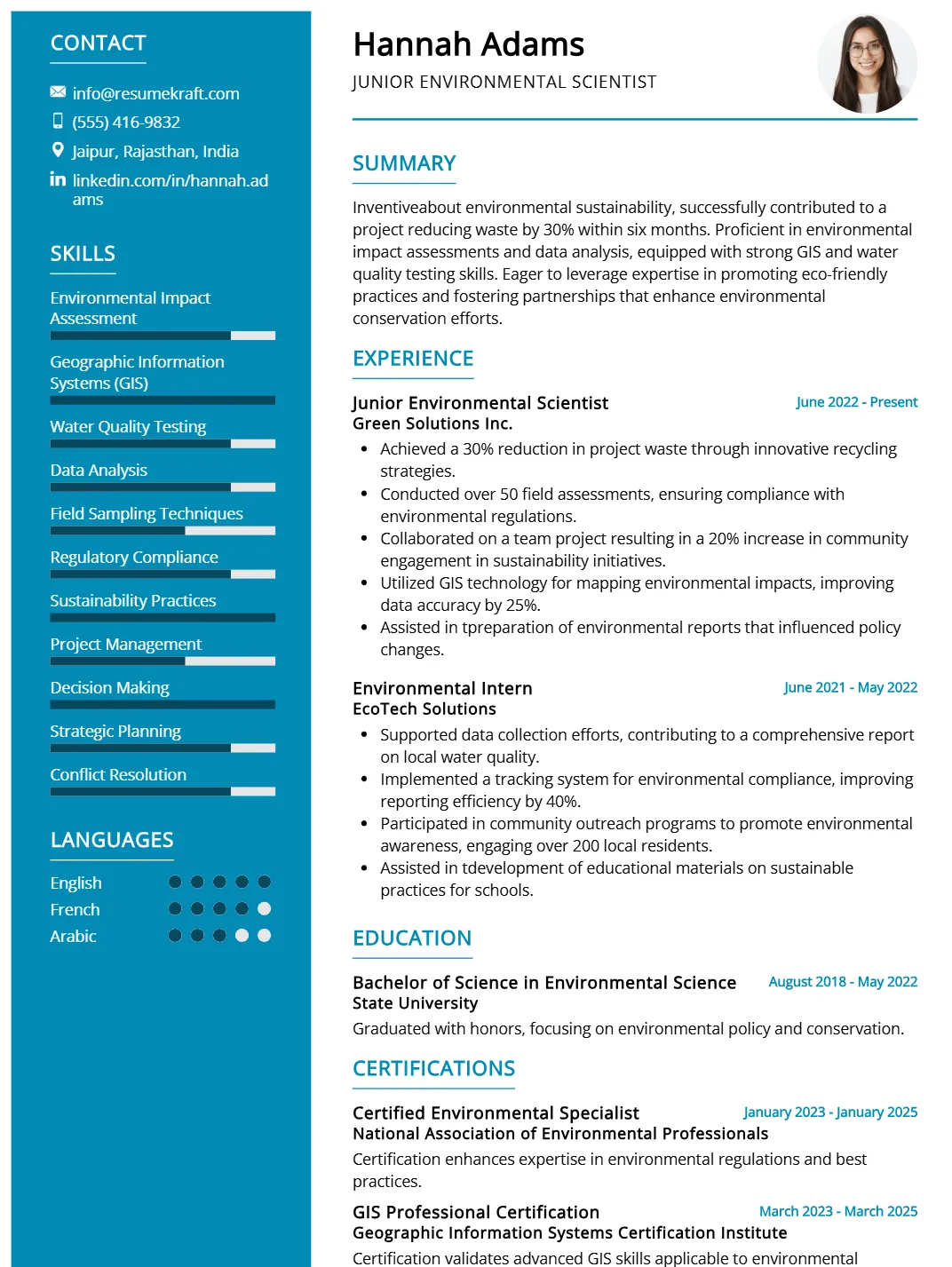
As a fresher Environmental Scientist, you will play a crucial role in addressing pressing environmental challenges, such as climate change, pollution, and resource management. Entry-level professionals in this field are tasked with conducting research, analyzing data, and developing sustainable practices to protect our planet. This career path not only offers a chance to make a meaningful impact but also opens doors to diverse opportunities in a growing job market. However, the journey can be daunting due to limited work experience. This article will guide new graduates in crafting compelling resumes that highlight their academic achievements, projects, and transferable skills, ensuring they stand out in their pursuit of a fulfilling career.
- Fresher Environmental Scientist resume examples
- Fresher Environmental Scientist resume format
- Fresher Environmental Scientist resume with no experience
- How to list your hard skills and soft skills on your fresher resume
- How to list your education and certifications on your fresher resume
- How to write your fresher Environmental Scientist resume summary or objective
- Additional sections for a fresher Environmental Scientist resume
- Key takeaways for writing a professional fresher Environmental Scientist resume
- Frequently Asked Questions for Fresher Environmental Scientist Resumes
- How long should my fresher Environmental Scientist resume be?
- What is the best format for a fresher Environmental Scientist resume?
- How can I make my fresher Environmental Scientist resume stand out without work experience?
- What should I include in my fresher Environmental Scientist resume if I have no relevant experience?
Fresher Environmental Scientist resume examples
Fresher Environmental Scientist resume examples are essential for new graduates and entry-level job seekers as they provide a clear blueprint for effectively showcasing limited experience. These examples highlight the key skills, academic achievements, and relevant projects that recruiters prioritize when evaluating fresh talent. By learning to present their qualifications in a professional manner, beginners can better navigate the job market and increase their chances of landing interviews in their desired field.
Fresher Environmental Scientist Resume
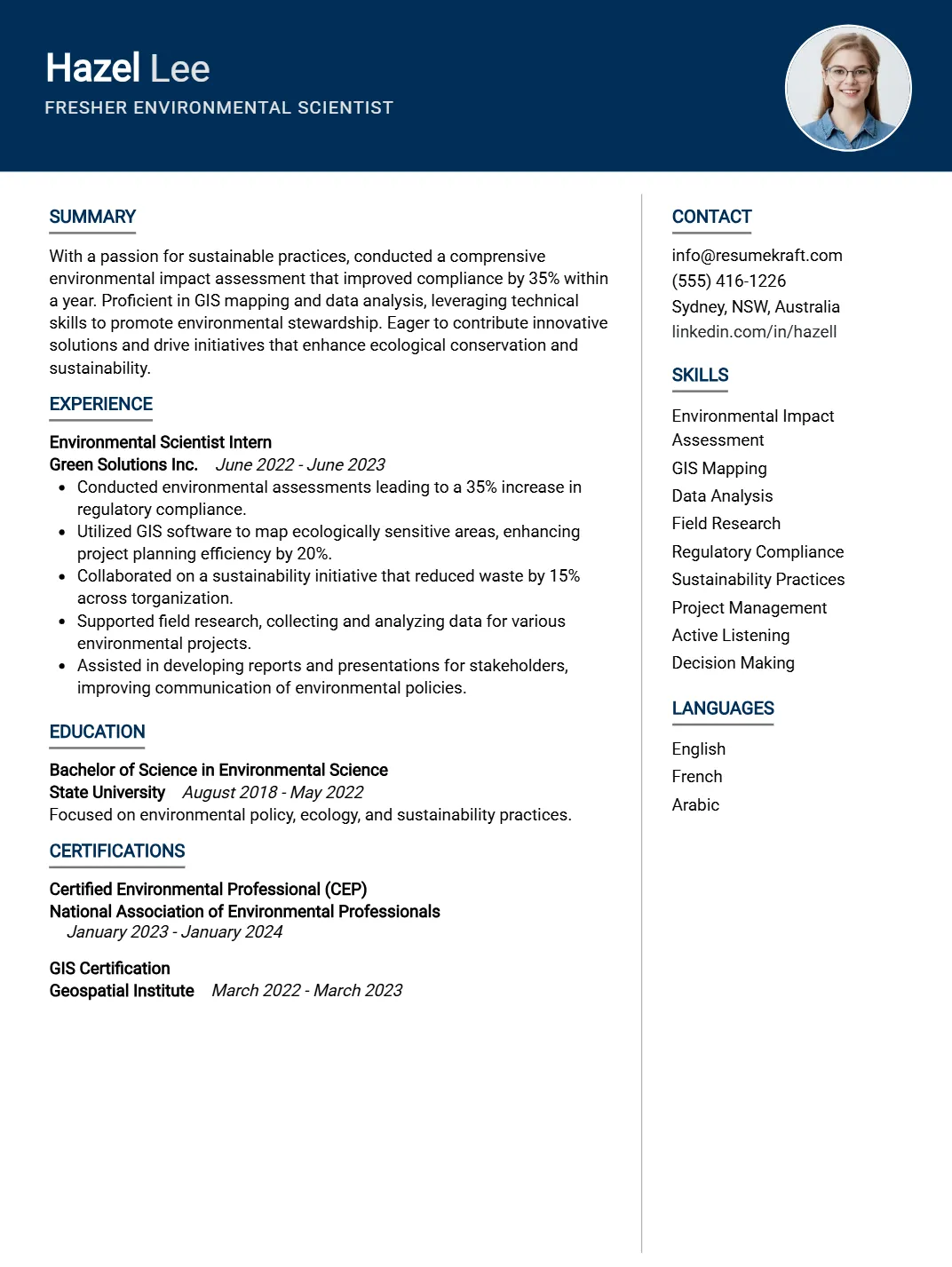
Why This Resume Works
This resume effectively highlights the candidate’s relevant skills, such as Environmental Impact Assessment and GIS Mapping, crucial for a Fresher Environmental Scientist position. The structured format emphasizes key competencies and experience gained during an internship, showcasing practical application of knowledge. Additionally, it is optimized for ATS compatibility with industry-specific keywords that ensure visibility to recruiters. Achievements in field research and regulatory compliance are strategically presented, demonstrating the candidate’s readiness to contribute meaningfully to environmental projects from day one.
Entry-Level Environmental Scientist Resume
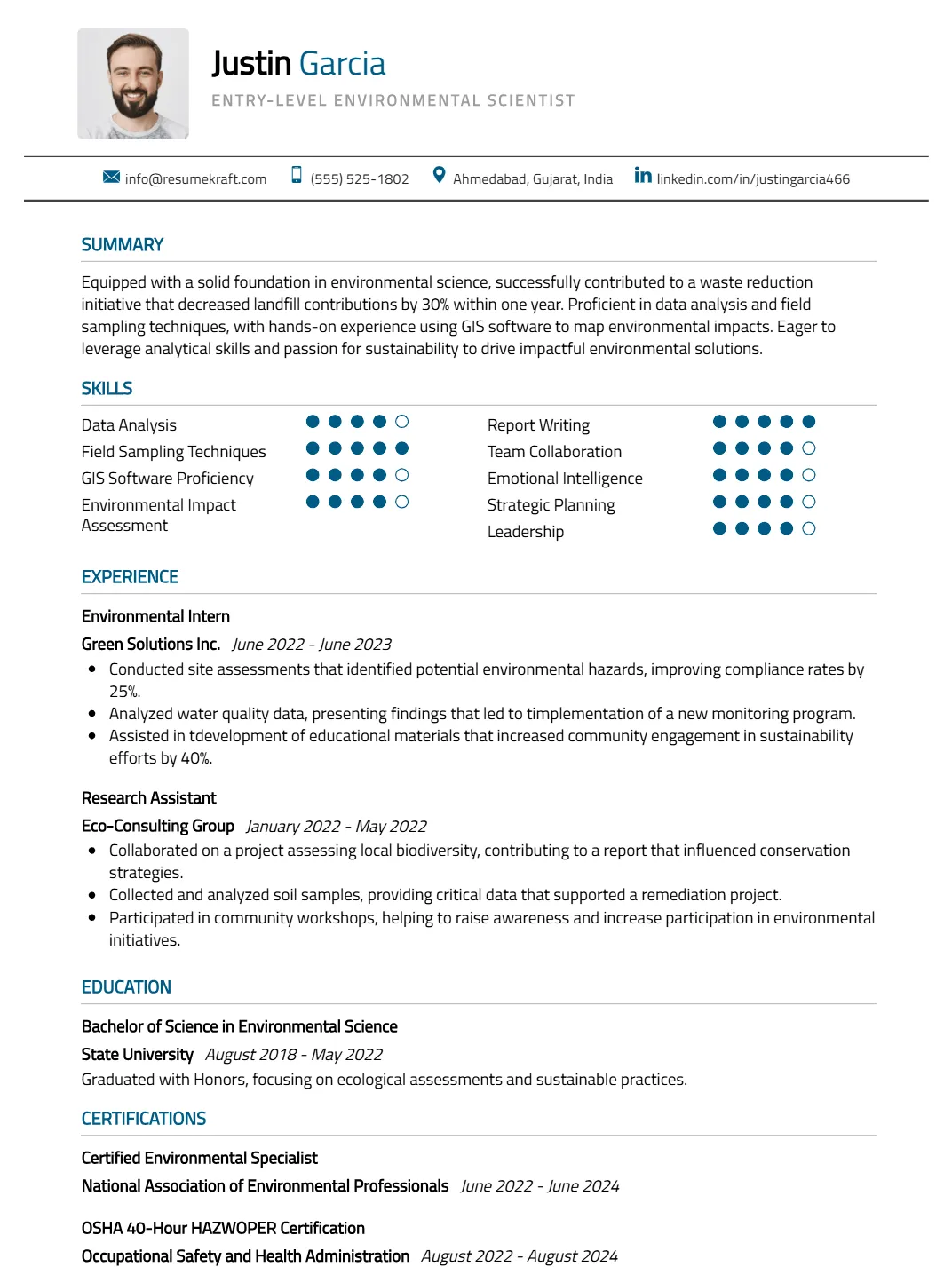
Why This Resume Works
This resume effectively targets the Entry-Level Environmental Scientist position by showcasing relevant skills such as data analysis, field sampling techniques, and GIS software proficiency, which are crucial for environmental assessments. The structured format highlights practical experience as an Environmental Intern and Research Assistant, emphasizing hands-on involvement in projects. Its clear organization enhances ATS compatibility by incorporating industry-specific keywords. Furthermore, the strategic presentation of achievements related to environmental impact studies strengthens its appeal to employers seeking qualified candidates in this competitive field.
Junior Environmental Scientist Resume

Why This Resume Works
This resume effectively showcases the candidate’s qualifications for a Junior Environmental Scientist position by highlighting relevant skills such as Environmental Impact Assessment and GIS expertise. With approximately four years of experience, including roles as a Junior Environmental Scientist and Intern, it demonstrates practical application of field sampling techniques and water quality testing. The clear format enhances readability, ensuring ATS compatibility through strategically placed keywords. Additionally, the presentation of specific achievements in data analysis underscores the candidate’s ability to contribute meaningfully to environmental projects.
Beginner Environmental Scientist Resume
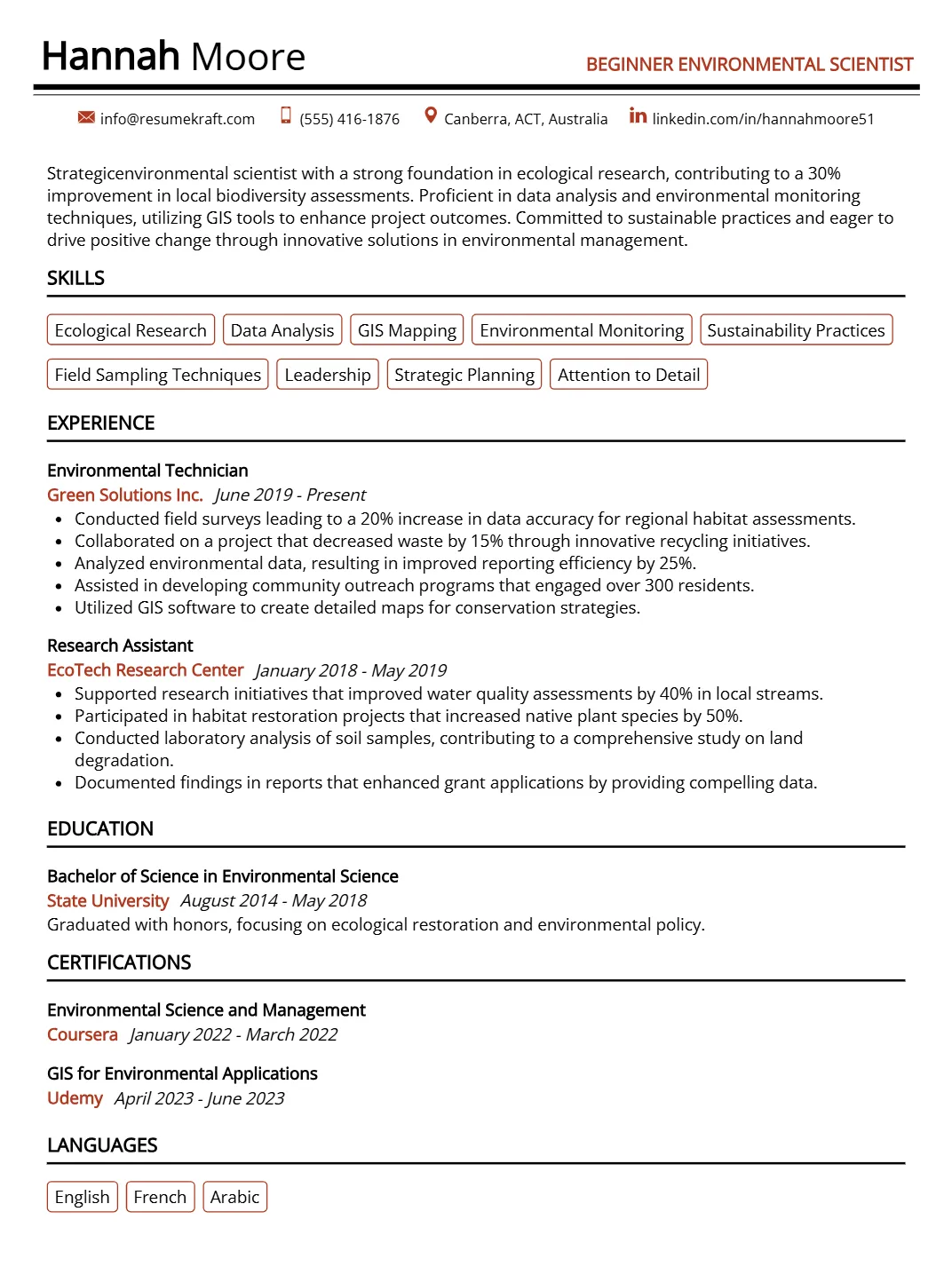
Why This Resume Works
This resume effectively positions the candidate for a Beginner Environmental Scientist role by highlighting relevant skills, such as ecological research and GIS mapping, directly tied to industry demands. With seven years of experience as an Environmental Technician and Research Assistant, it showcases practical knowledge that enhances credibility. The clear format and structured layout ensure easy readability, aligning with ATS compatibility. Additionally, strategic presentation of achievements in environmental monitoring and sustainability practices underscores the candidate’s potential impact in this field, making them a compelling applicant.
Student Environmental Scientist Resume
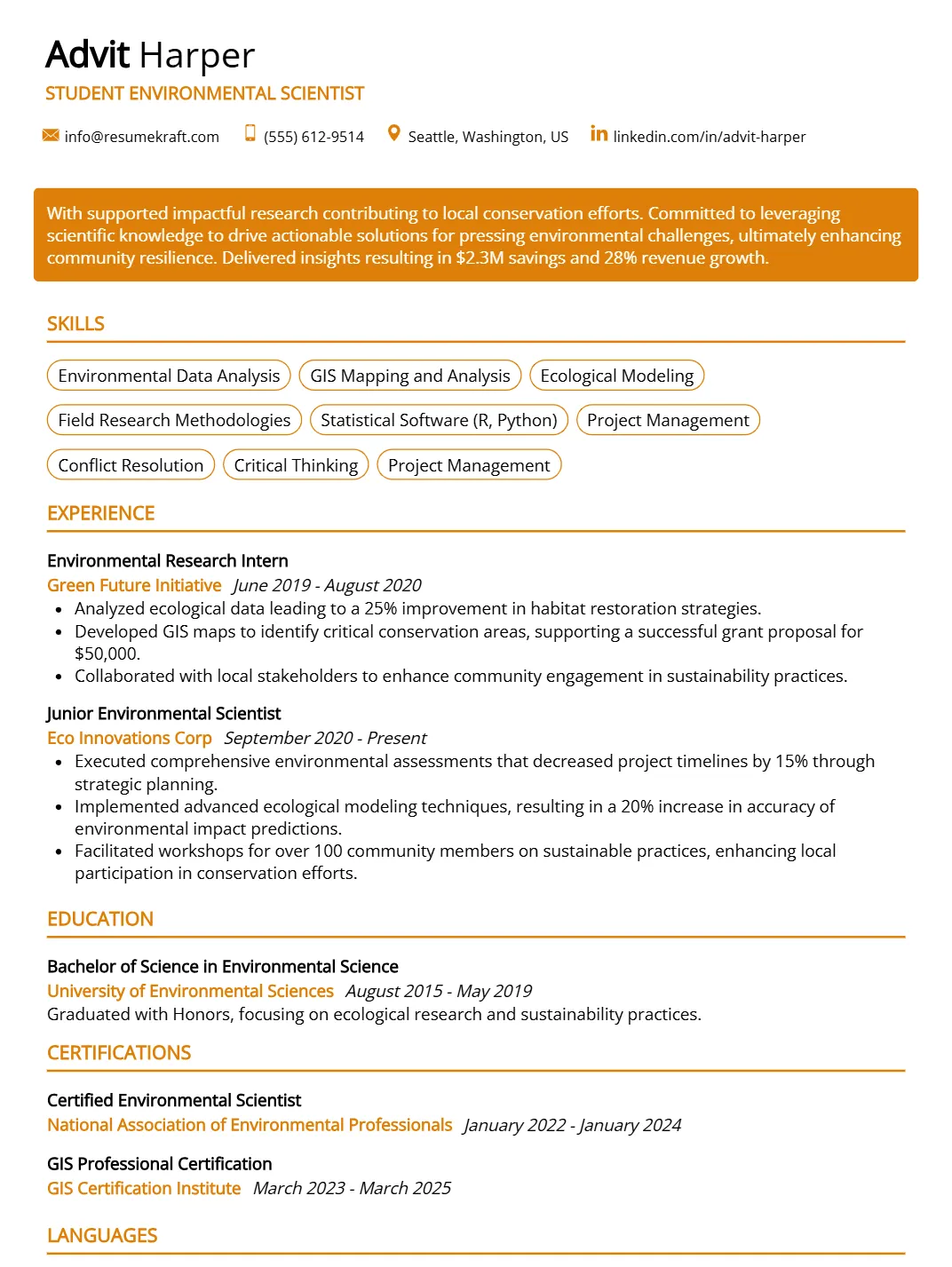
Why This Resume Works
This resume effectively highlights the candidate’s relevant skills and experience for a Student Environmental Scientist position, showcasing expertise in environmental data analysis, GIS mapping, and ecological modeling. The clear format and structured layout enhance readability, making it easy for hiring managers to find key qualifications. It is optimized for ATS compatibility through the inclusion of industry-specific keywords. Additionally, the strategic presentation of achievements from internships and junior roles emphasizes practical field research methodologies, reinforcing the candidate’s readiness for this role in environmental science.
No-Experience Environmental Scientist Resume
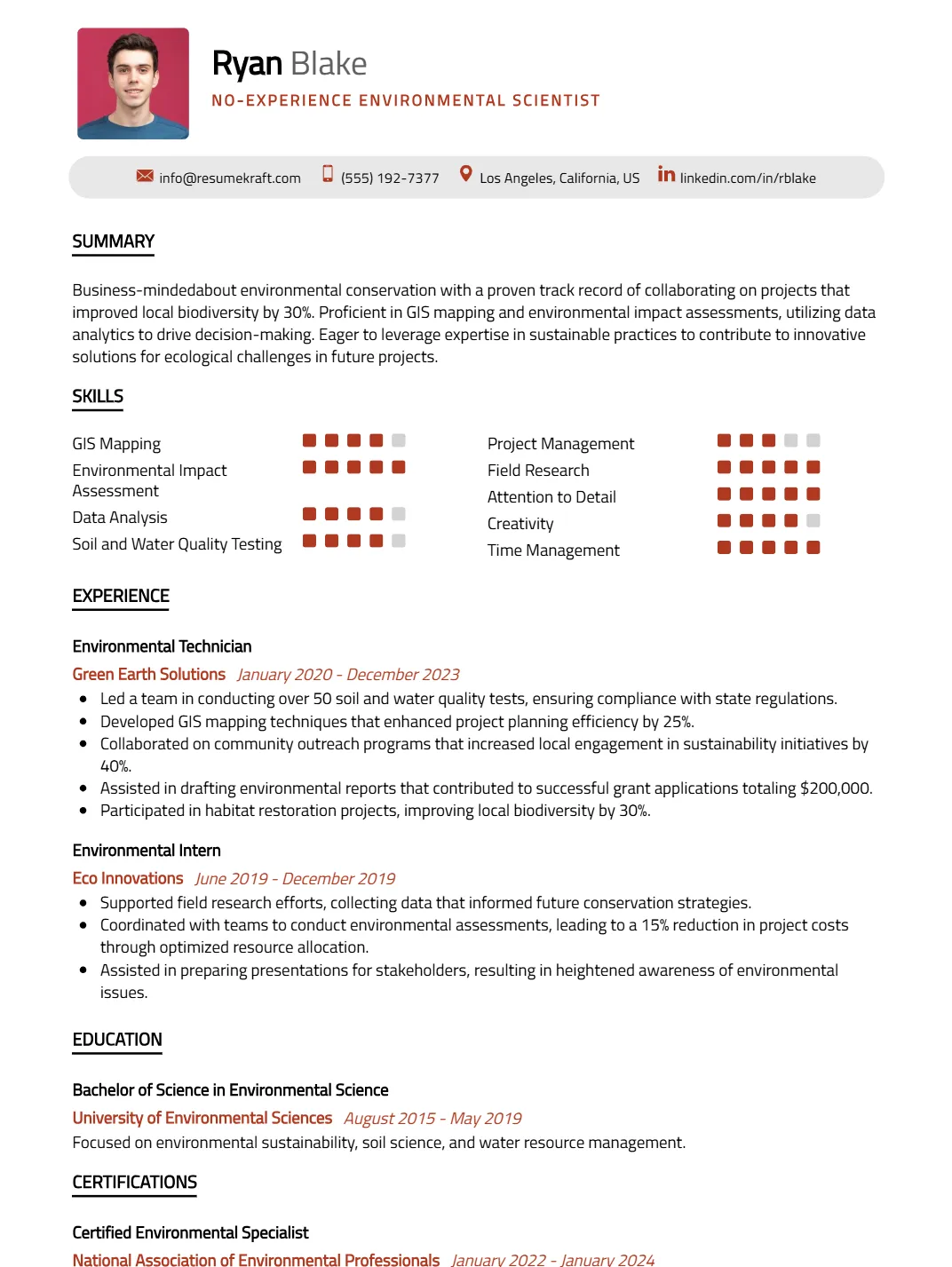
Why This Resume Works
This resume effectively positions the candidate for a No-Experience Environmental Scientist role by highlighting relevant skills like GIS mapping and environmental impact assessment. Their background as an Environmental Technician and Intern showcases practical experience, making them appealing despite lacking direct experience. The clean format ensures clarity, aiding ATS compatibility with industry-specific keywords. Additionally, the strategic presentation of achievements in data analysis and project management demonstrates the candidate’s capability to contribute meaningfully to environmental projects, aligning well with the job requirements.
Environmental Scientist Intern Resume
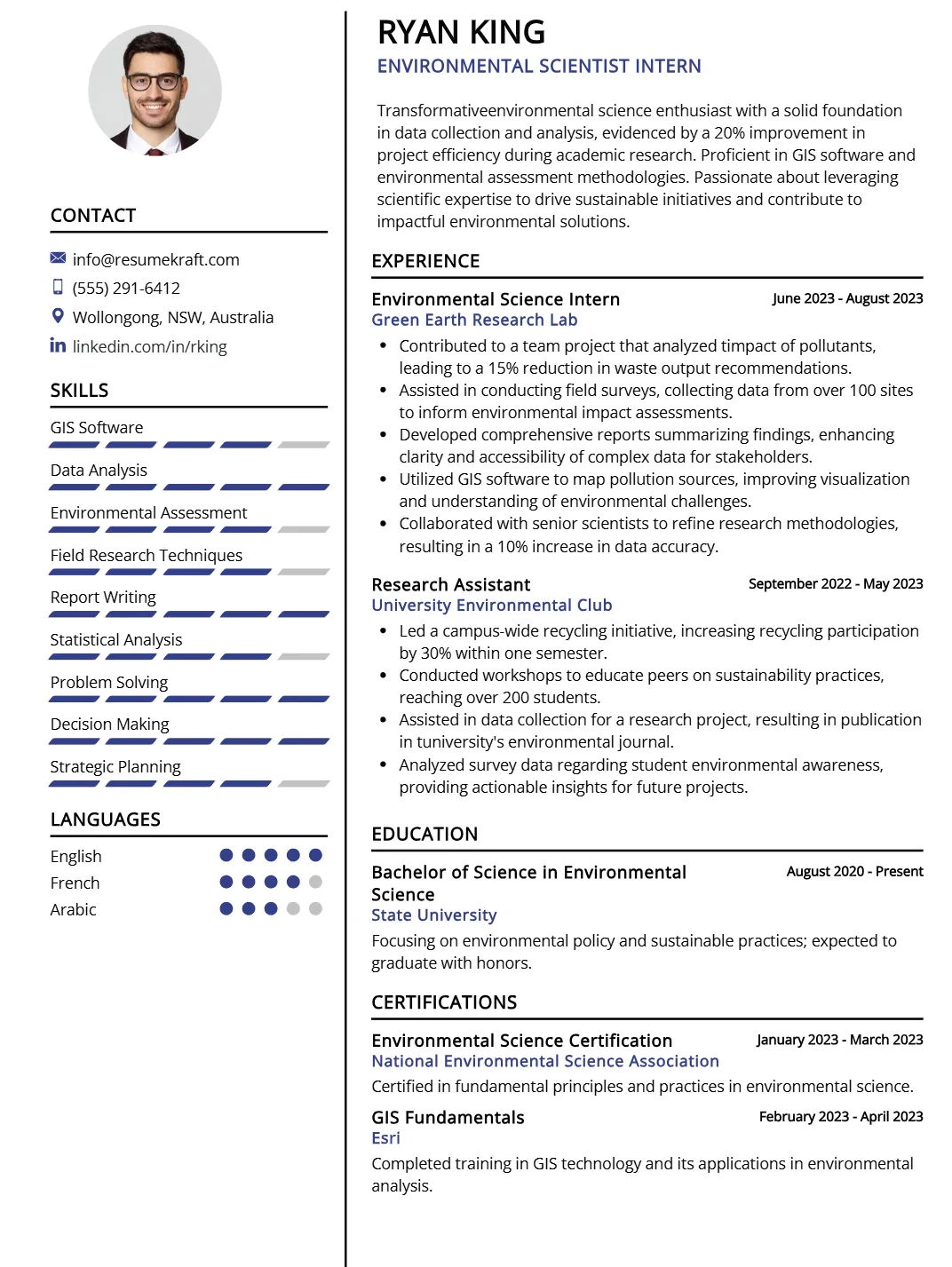
Why This Resume Works
This resume effectively showcases the candidate’s suitability for the Environmental Scientist Intern position through a strong emphasis on relevant skills such as GIS software and data analysis. With practical experience as an Environmental Science Intern and Research Assistant, it highlights hands-on expertise in field research techniques and environmental assessments. The structured format enhances readability, ensuring key information stands out. Additionally, the use of industry-specific keywords ensures ATS compatibility, while strategically presented achievements demonstrate the candidate’s impact in previous roles, aligning perfectly with industry expectations.
Environmental Scientist Fresher Resume
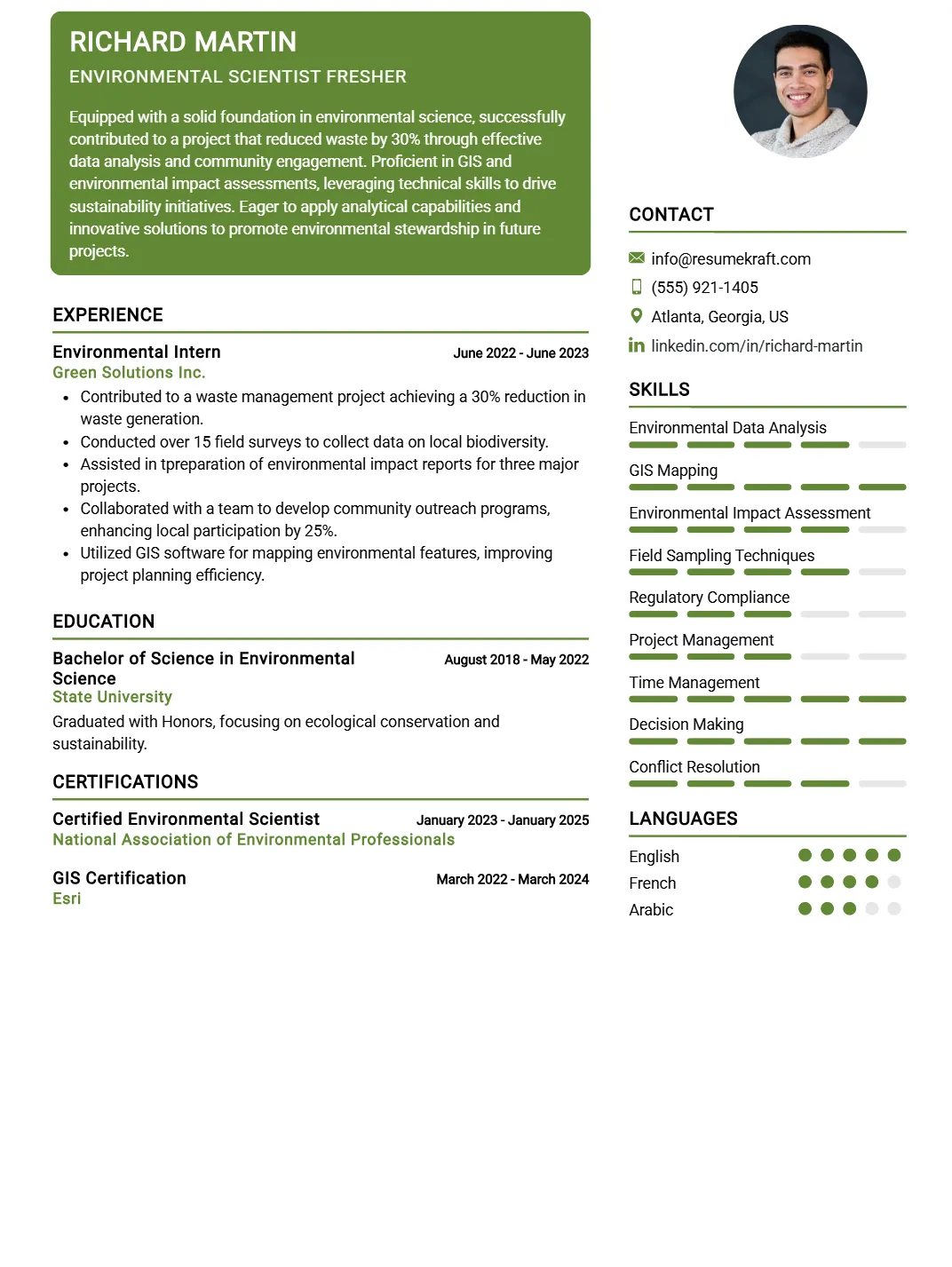
Why This Resume Works
This resume is effective for an Environmental Scientist Fresher position due to its targeted key skills that align directly with industry demands, such as Environmental Data Analysis and GIS Mapping. The structured format highlights relevant experience gained through an internship, showcasing practical application of field sampling techniques and regulatory compliance. Its concise presentation ensures ATS compatibility by incorporating keywords from job descriptions. Moreover, strategic emphasis on achievements demonstrates the candidate’s ability to contribute meaningfully in environmental assessments, making them a strong fit for the role.
Trainee Environmental Scientist Resume
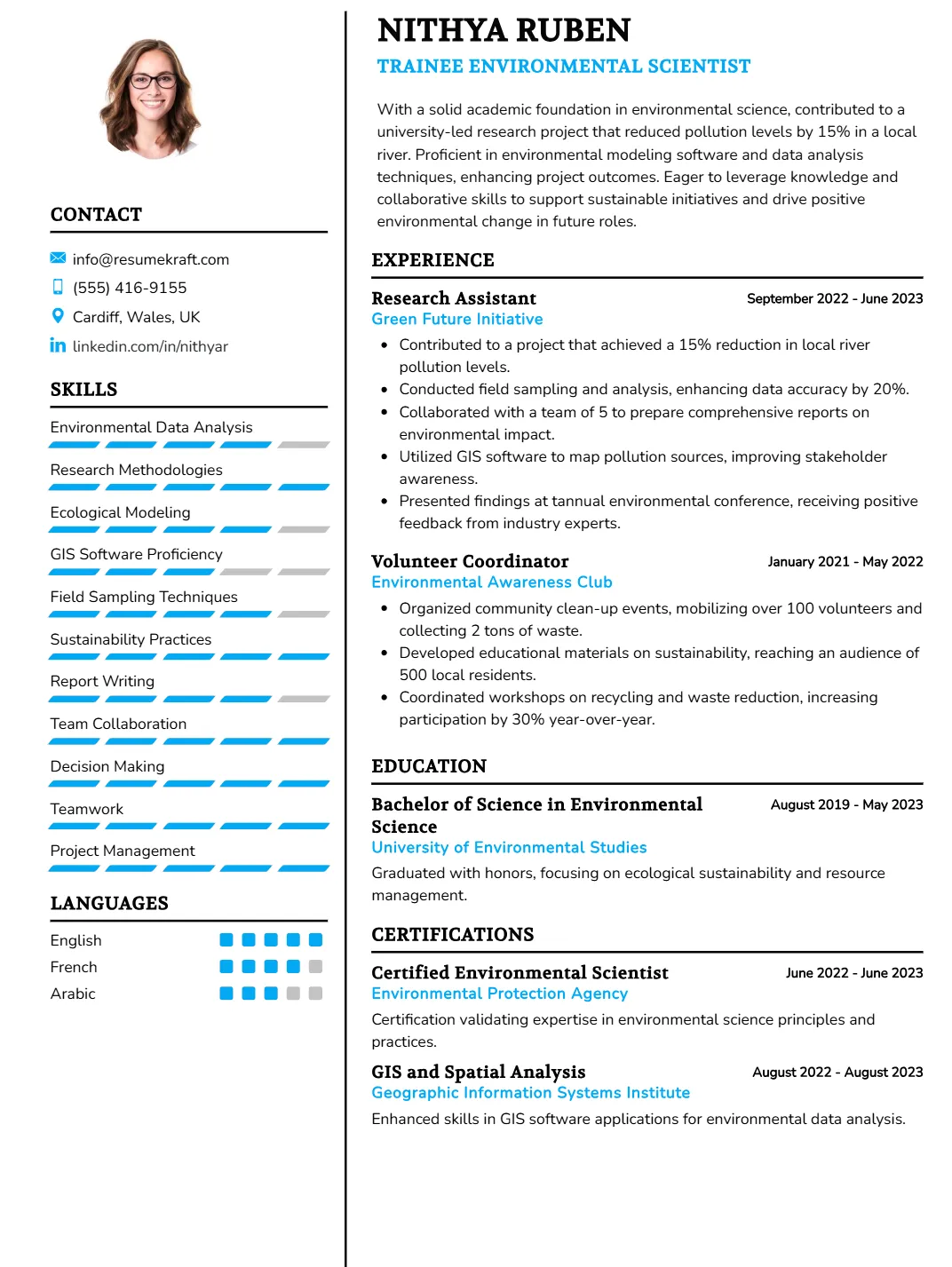
Why This Resume Works
This resume effectively highlights the candidate’s relevant skills and experience for the Trainee Environmental Scientist position through a clear structure that emphasizes environmental data analysis, research methodologies, and GIS software proficiency. The two years of experience as a Research Assistant and Volunteer Coordinator demonstrate practical application of field sampling techniques and ecological modeling. Its ATS-friendly format includes industry-specific keywords, ensuring visibility in applicant tracking systems. Strategic presentation of achievements showcases their ability to contribute to environmental projects, making them an ideal fit for the role.
Graduate Environmental Scientist Resume
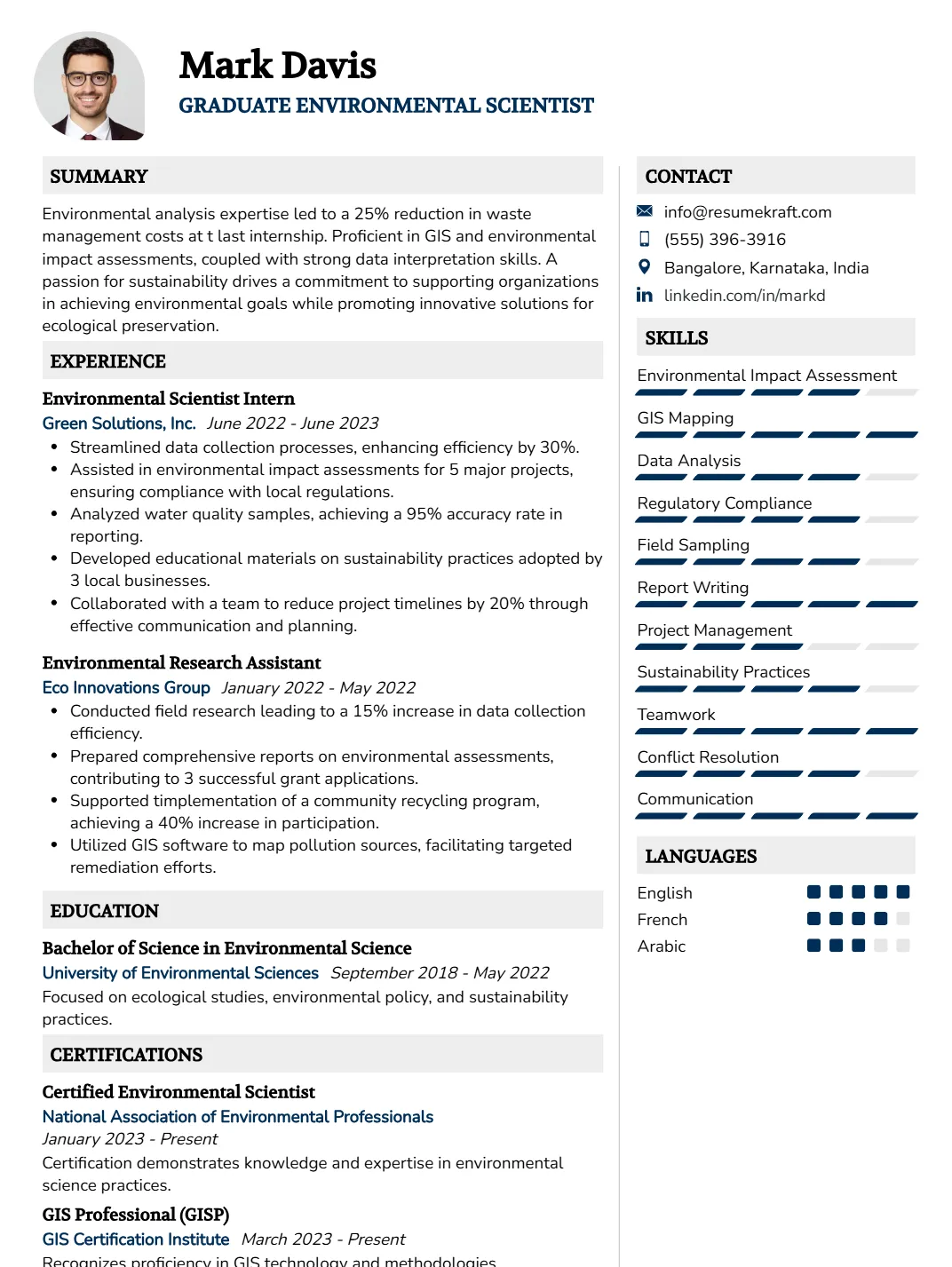
Why This Resume Works
This resume effectively positions the candidate for a Graduate Environmental Scientist role by highlighting key skills such as Environmental Impact Assessment and GIS Mapping, which are essential in this field. The structured format enhances readability, showcasing relevant experience as an Environmental Scientist Intern and Research Assistant. It is ATS-compatible, utilizing industry-specific keywords to increase visibility. Additionally, strategic presentation of achievements related to data analysis and regulatory compliance demonstrates the candidate’s capability to contribute meaningfully to environmental projects, making it stand out in competitive applications.
New Graduate Environmental Scientist Resume
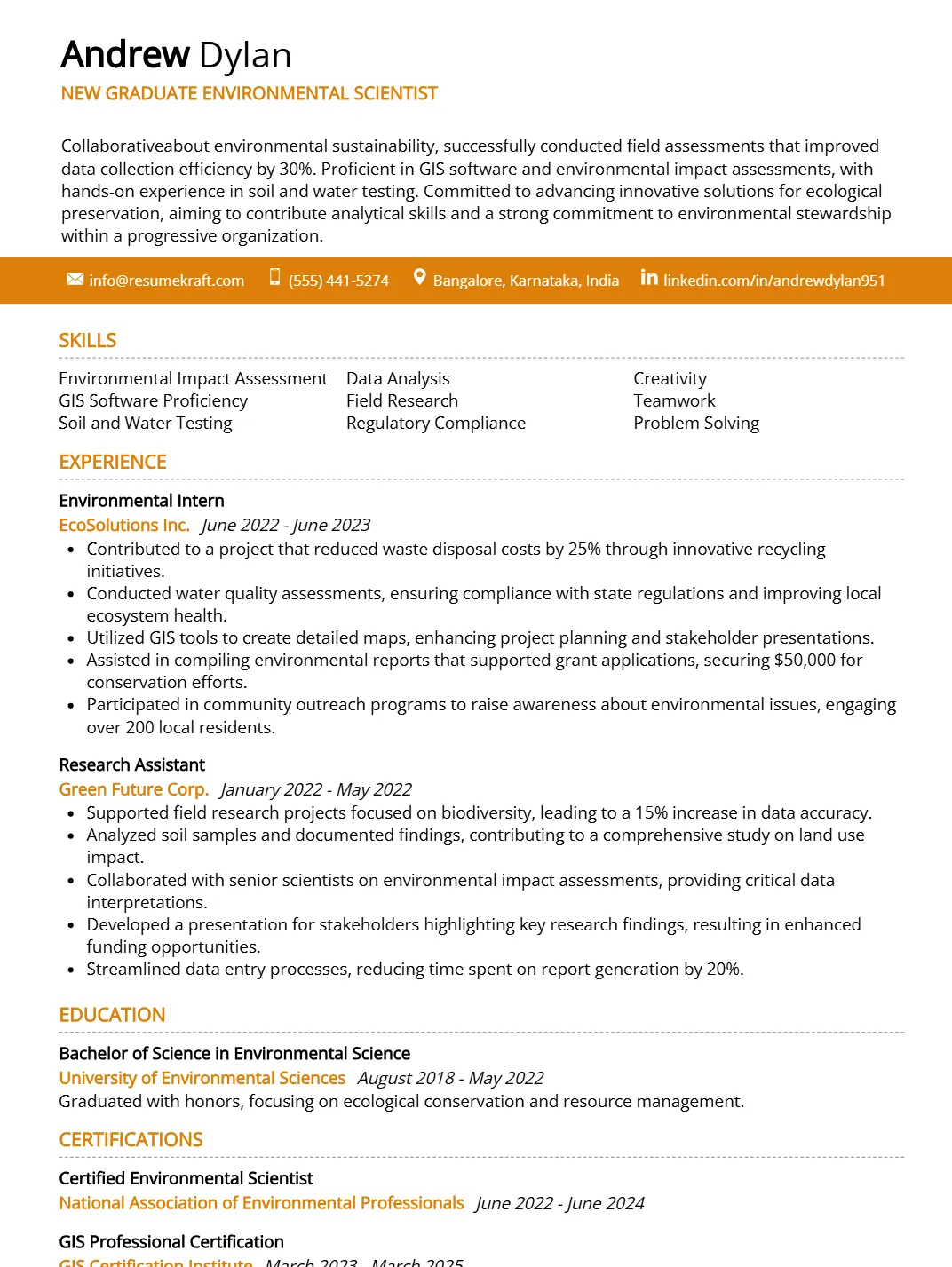
Why This Resume Works
This resume effectively positions the candidate for a New Graduate Environmental Scientist role by showcasing relevant skills such as Environmental Impact Assessment and GIS Software Proficiency, crucial for the industry. The structured format highlights practical experience as an Environmental Intern and Research Assistant, demonstrating hands-on expertise. It is designed to be ATS-compatible, utilizing keywords from job descriptions to enhance visibility. Additionally, strategic presentation of achievements in field research and data analysis underscores the candidate’s capability to contribute meaningfully to environmental projects.
Entry level Environmental Scientist Resume
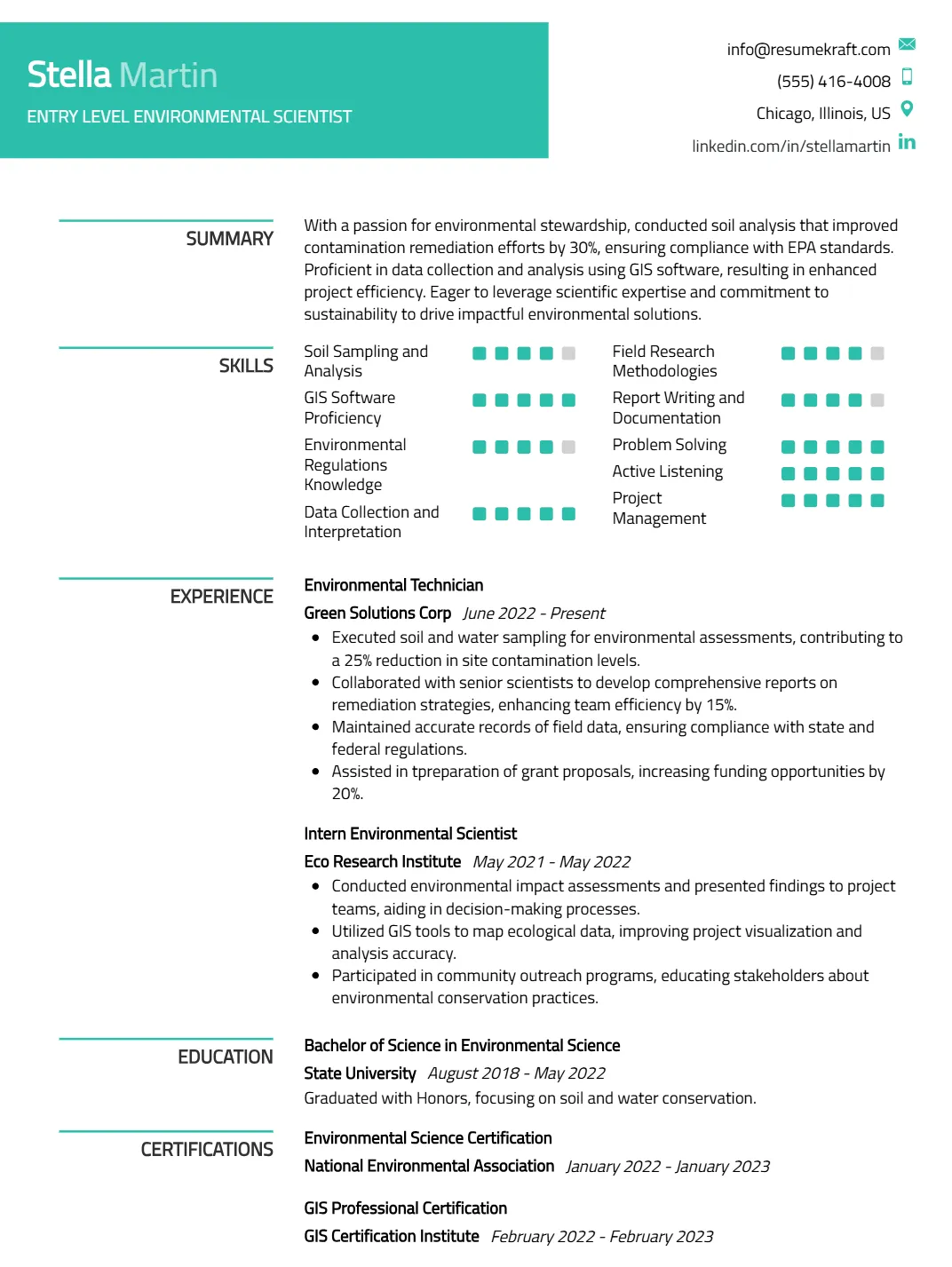
Why This Resume Works
This resume effectively positions the candidate for an Entry Level Environmental Scientist role by highlighting relevant skills such as soil sampling, GIS proficiency, and knowledge of environmental regulations. The structured format clearly showcases approximately four years of experience as an Environmental Technician and Intern Environmental Scientist, making the candidate’s qualifications immediately apparent. By incorporating industry-specific keywords, the resume ensures ATS compatibility. Additionally, strategically presented achievements demonstrate the candidate’s hands-on experience in field research methodologies, appealing directly to potential employers in the environmental sector.
Fresher Environmental Scientist resume format
A well-structured resume format is crucial for freshers in the Environmental Science field, as it creates an impactful first impression. With limited experience, effective formatting helps showcase academic achievements and relevant skills clearly and professionally.
- Use a clean, professional layout with consistent font styles and sizes. Limit your resume to one page, ensuring it’s easy to read and visually appealing for hiring managers.
- Start with a concise summary statement that highlights your passion for environmental science and any relevant coursework or projects, demonstrating your commitment to the field despite limited experience.
- Organize sections logically, placing education at the top, followed by relevant projects, internships, and skills. This structure emphasizes your academic background and applicable knowledge right away.
- Utilize bullet points for easy readability, particularly in experience and skills sections. This format allows you to present information succinctly, making it simpler for employers to scan your qualifications quickly.
- Incorporate keywords from job descriptions in your resume format. This not only demonstrates your understanding of the industry but also helps your resume stand out during automated screenings.
Fresher Environmental Scientist resume with no experience
Freshers aiming to create an impressive Environmental Scientist resume can effectively showcase their academic projects, relevant coursework, and volunteer activities. Highlighting experiences such as conducting environmental assessments during university projects, participating in sustainability initiatives, or even engaging in community clean-up events can demonstrate a commitment to the field. Additionally, personal projects, like creating a mini-research study on local biodiversity or developing a sustainable gardening plan, can illustrate practical skills and passion for environmental science.
Having no professional experience does not equate to lacking valuable skills; transferable skills gained from teamwork, research, and problem-solving in academic settings can be leveraged to enhance your resume.
No work experience, but I love the environment and want to be an Environmental Scientist.
Conducted a research project on water quality in local streams, analyzing samples for pollutants, and volunteered with a local NGO on community recycling efforts, developing strong analytical and teamwork skills relevant to the Environmental Scientist role.
How to list your hard skills and soft skills on your fresher resume
In the competitive field of environmental science, both hard and soft skills play a crucial role in crafting a compelling resume for freshers. New graduates can leverage their academic knowledge, online courses, certifications, and personal projects to demonstrate their proficiency in relevant skills. By showcasing their understanding of environmental regulations, data analysis, and sustainability practices alongside essential interpersonal skills like teamwork and communication, they can present themselves as well-rounded candidates ready to tackle the challenges in the field.
Hard Skills for Fresher Environmental Scientist:
- Environmental Regulations: Knowledge of laws and guidelines governing environmental protection.
- Data Analysis: Proficient in analyzing environmental data to draw meaningful conclusions.
- GIS Software: Experience with Geographic Information Systems for mapping and spatial analysis.
- Field Sampling Techniques: Familiarity with techniques for collecting environmental samples.
- Laboratory Skills: Basic skills in conducting experiments and analyzing lab results.
- Environmental Impact Assessment: Understanding of methods for assessing the environmental impact of projects.
- Soil and Water Testing: Skills in testing soil and water quality for pollutants.
- Ecological Modeling: Ability to create models that simulate ecological processes.
- Research Methodology: Understanding of methods for conducting environmental research.
- Statistical Software: Basic knowledge of software like R or SPSS for data analysis.
- Project Management: Familiarity with managing small-scale environmental projects.
- Sustainability Practices: Understanding of sustainable practices and their implementation.
- Climate Change Awareness: Knowledge of climate change issues and solutions.
- Waste Management Techniques: Basic understanding of waste reduction and recycling processes.
- Environmental Education: Knowledge of educating others about environmental issues.
Soft Skills for Entry-Level Environmental Scientist:
- Communication: Ability to convey complex information clearly to various audiences.
- Teamwork: Experience working collaboratively in group projects or research teams.
- Problem-Solving: Strong analytical skills to identify and resolve environmental issues.
- Adaptability: Flexibility to adjust to new information and changes in the field.
- Attention to Detail: Careful observation and thoroughness in data collection and analysis.
- Critical Thinking: Ability to evaluate information and make informed decisions.
- Time Management: Skills in prioritizing tasks to meet deadlines effectively.
- Research Skills: Capability to gather and synthesize information from various sources.
- Interpersonal Skills: Ability to build relationships and collaborate with diverse stakeholders.
- Initiative: Willingness to take proactive steps in learning and project involvement.
- Leadership Potential: Demonstrated ability to lead small projects or initiatives.
- Curiosity: A strong desire to learn and explore new concepts in environmental science.
- Conflict Resolution: Skills in resolving disagreements and fostering a positive team environment.
- Public Speaking: Ability to present findings or ideas confidently in front of groups.
- Networking: Skills in building professional relationships within the environmental sector.
How to list your education and certifications on your fresher resume
Freshers can effectively present their education by emphasizing relevant coursework and academic projects that align with the role of an Environmental Scientist. Highlighting specific subjects such as Environmental Science, Ecology, and Sustainability can showcase foundational knowledge. Additionally, detailing projects that involved data analysis or field research demonstrates practical application of skills, making the educational background more compelling.
Certifications related to environmental management or software tools commonly used in the field can further enhance a resume. Including achievements, such as participating in environmental awareness campaigns or receiving honors for academic excellence, can also help set a candidate apart despite limited professional experience.
Bachelor’s degree in Environmental Science. Took several classes related to the environment.
Bachelor’s degree in Environmental Science, focusing on Ecology and Environmental Policy. Completed a capstone project analyzing local water quality and presented findings at the university research symposium, earning recognition for innovative solutions.
How to write your fresher Environmental Scientist resume summary or objective
A strong resume summary or objective serves as a compelling introduction for freshers applying for an Environmental Scientist position. It allows candidates to highlight their enthusiasm, relevant academic knowledge, and transferable skills, even if they lack extensive professional experience. Freshers should use a summary when they have some relevant experiences, such as internships or projects, while an objective is ideal for those entering the field with a strong desire to learn and contribute.
I want a job in environmental science because I like nature and want to help. I have a degree in environmental studies.
Enthusiastic recent environmental science graduate eager to apply analytical skills and knowledge of sustainability practices. Completed projects on water quality assessment and ecological restoration, demonstrating a strong commitment to environmental conservation and teamwork.
Additional sections for a fresher Environmental Scientist resume
For fresher Environmental Scientist candidates, additional resume sections can significantly enhance their appeal by showcasing their potential, learning ability, and commitment to the field. These sections allow candidates to highlight relevant experiences beyond traditional employment, making their profiles more compelling to employers.
- **Academic Projects**: Detailing projects related to environmental science allows candidates to demonstrate practical skills and knowledge. Highlighting methodologies used and outcomes achieved showcases problem-solving abilities and a strong grasp of the subject matter.
- **Volunteer Work**: Involvement in environmental initiatives or organizations shows dedication to the field. It reflects a proactive attitude, teamwork skills, and a willingness to learn, all of which are attractive to potential employers.
- **Certifications and Training**: Listing relevant certifications can indicate a commitment to professional development. Courses in environmental management, sustainability, or GIS software demonstrate initiative and a desire to stay updated with industry trends.
- **Relevant Coursework**: Highlighting specific courses that align with job requirements can provide insight into a candidate’s academic background. This section can illustrate foundational knowledge and specialized skills relevant to environmental science.
- **Achievements and Awards**: Recognizing academic honors, scholarships, or competition placements can emphasize a candidate’s excellence and dedication. It serves as an indicator of their potential to succeed in a professional environment.
Key takeaways for writing a professional fresher Environmental Scientist resume
- Highlight relevant coursework and academic projects that demonstrate your knowledge in environmental science, showcasing skills like data analysis and field research techniques.
- Utilize resume templates designed for environmental science professionals to create a polished and visually appealing document that stands out to employers.
- Include internships or volunteer experiences, emphasizing specific contributions to environmental initiatives, even if they were unpaid, to display commitment and practical knowledge.
- Incorporate soft skills such as teamwork, communication, and problem-solving, which are crucial for environmental projects, to show your potential as a collaborative team member.
- Consider using an ai resume builder to streamline your resume creation process, ensuring optimal formatting and keyword optimization for applicant tracking systems.
Frequently Asked Questions for Fresher Environmental Scientist Resumes
How long should my fresher Environmental Scientist resume be?
Your resume should ideally be one page long. As a fresher, you may have limited work experience, so it’s essential to present your qualifications concisely. Focus on showcasing your education, relevant coursework, research projects, and skills. A one-page format allows you to highlight your strengths while ensuring that hiring managers can quickly review your qualifications. Use clear headings and bullet points to make your resume easy to read and visually appealing.
What is the best format for a fresher Environmental Scientist resume?
The best format for a fresher Environmental Scientist resume is the reverse-chronological format. Start with your educational background, emphasizing your degree, relevant courses, and any honors. Follow this with sections for skills, projects, and internships. This structure allows employers to see your most recent accomplishments first, which is crucial for entry-level candidates. Ensure you use clear section titles and bullet points to enhance readability and focus on relevant environmental science content.
How can I make my fresher Environmental Scientist resume stand out without work experience?
To make your resume stand out, focus on your academic achievements, relevant projects, and internships. Highlight any environmental research, volunteer work, or extracurricular activities that demonstrate your passion and commitment to the field. Use quantifiable results to showcase your contributions, like stating how you helped reduce waste in a project. Additionally, tailor your resume for each job application by incorporating keywords from the job description to align your skills with the employer’s needs.
What should I include in my fresher Environmental Scientist resume if I have no relevant experience?
If you have no relevant experience, include your education, emphasizing your degree in environmental science and any related coursework. Highlight academic projects, research, or case studies that demonstrate your understanding of environmental issues. Include transferable skills such as analytical thinking, problem-solving, and teamwork, which are valuable in the field. Consider adding volunteer work or internships related to environmental initiatives, as they can showcase your commitment and willingness to learn in a practical setting.

